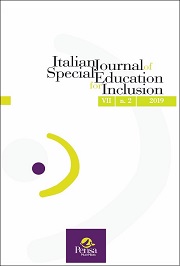La qualità dell’inclusione nel sistema scolastico italiano alla luce della Dichiarazione di Salamanca e nella prospettiva dell’ICF
DOI:
https://doi.org/10.7346/sipes-02-2019-13Abstract
The Declaration of Salamanca (UNESCO, 1994) has represented an opportunity for the development of the principles that the international organizations have utilized, in the last years, to develop the basis of inclusive education (UNESCO, 2005, 2009; UN, 2006, CoE, 2018). Therefore, on the one hand, the importance of the full participation of students with SEN in the ordinary
classes, has been emphasized; in the other hand, the urgency to facilitate this participation by the adaptation of the environmental factors present at school has been more and more clear.
These principles are consistent with the bio-psycho-social model of “human functioning” that the WHO has elaborated in the ICF (WHO, 2001, 2007, 2017). At this moment, in the Italian school law, the ICF represents the conceptual reference of all actions aimed to develop school inclusion. The present paper analyses how the ICF culture enhances the concepts of curriculum and school management identified by the Salamanca Declaration as “scholastic-factors” decisive for inclusion. The authors present a reflection about how, in the last decade, these concepts have been developed in Italian schools, and about how these are encouraging the methods of didactic planning, the evaluation, the teacher-training and the governance of special educational needs in an inclusive direction.


